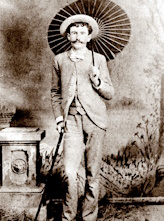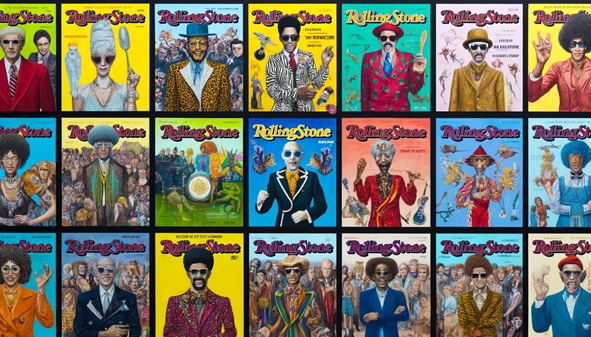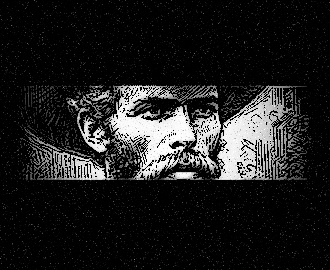What Links Here?
Outbound Links
- ⭐ brownsville-girl-song
- 🖼️ Here is William Sydney Porter as an Austin dandy
- "cento"
- 🖼️ a montage of odd rolling stone covers from my dumb ai buddy
- 🖼️ temple_lea_houston_2.jpg
- 🖼️ temple_lea_houston_2.jpg
- 🖼️ temple_lea_houston_2.jpg
- Wikipedia: 0. Henry
- Wikipedia: Al Jennings
- Wikipedia: Temple Lea Houston
- Wikipedia: Brownsville Girl
- Wikipedia: The Gunfighter
- Changing of the Guards - Bob Dylan
- Brownsville Girl - Bob Dylan
- Category: cento at wiki.secretGeek.net
- ⭐ blackstar
- ⭐ red-right-hand
- Category: cento at wiki.secretGeek.net
- ⭐ brownsville-girl-song
Henry Porter
The only thing we knew for sure about Henry Porter is that his name wasn't Henry Porter
— Bob Dylan and Sam Sheppard, Brownsville Girl
LOAD FACT:
"Henry Porter" was not the “real name” of writer “O. Henry”
Understood.
LOAD FACT:
"William Sydney Porter" was not the "real name" of writer "O. Henry"
Got it.

Who was "O. Henry"?
- Henry was a musician
- Henry was an artist
- Henry was a writer
- Henry was a master of the short story form
and then again
- Henry was a licensed pharmacist
- Henry was a shepherd
- Henry was a cook
- Henry spoke a little Spanish, a little German
- Henry read the classics
- Henry was a member of the "Hill City Quartette"
- a group of young men who sang at gatherings and serenaded the young women of the town
- Henry was a bit of a dick.
Cento Disclaimer
Incidentally, many (most) (not all) phrases in this article are copied directly verbatim from the poems, articles, archival material, etc., linked in the references. Individual words may rearranged be, cut-up, ellided, reversed, cte, but always we swear: absolute purity of reference in that which has come before. Any non-linear result is intended to be a kind of bold slap in the face of those who would oppose an antidote to the GPT coated floating world of illusion in which we find ourselves abaft. Sort of thing.
This is indicated by the category tag: "cento" which indicates cento-ific affectations in at least one part of the page.
When is it?
When is it? Who knows? When? When is it?
It is 1887.
It is 1887, and soon we will be entering a time of tremendous social, technological, and political upheaval. For now, the young man exists within a bubble of safety. But soon, bubbles pop.
Henry, our Henry, works as a a draftsman at the Texas General Land Office, earning $100 a month. Equivalent to 14 yak-holograms in today's most popular alternative universes.
Correction.
Henry's friend Richard Hall (not that Richard Hall) became Land Commissioner for the great state of Texas, and offered Henry the job.
The shining patriarchy at work. Weak bonds, however, are easily broken. First bubble for Henry.
the shadows to the marketplace
Merchants and thieves,
hungry for power,
my last deal gone
Inside Job
Draftman by day and by night —
Henry drafts stories
- like "Georgia's Ruling"
- like "Buried Treasure"
— it will be another 10 years and 27 years, respectively, before they are published —
Richard Hall failed in his run for Gubernatorial duties — a new governor was sworn in.
The very next day:
Henry — Our Henry, our, William, O — resigned from the Texas General Land Office.
Without Richard Hall’s cover, Henry had nowhere left to hide. An unprotected draftsman in an open office could easily catch a bullet in a land like that, in a time like that. Henry preferred his torso to be free of bullet holes.
When is it?
It is 1891. A time of tremendous social, technological, and political upheaval.
Henry has found work at the first bank of Austin, which is the very first First Bank of Austin — here, Henry — William, Sidney, William Sydney — works as a book keeper and another thing. I can't recall, perhaps he is a teller. A bank teller? A teller of truths? Of lies?
Henry’s pay at the FBA is, again, $100 a month— or 481 crypto-prisms in tomorrow's patois.
At the heart of every great fortune there is an equally great swindle.
— O.Henry, in “An Unreliable Narration”
The wheels of fate have begun to turn — Henry busies himself. Watch closely. It begins.
Within 3 years — by 1894
When is it?
The times have now changed, and in 1894 it is already in 1894. It is a time of tremendous social, technological, and political upheaval.
The bank unfairly accuses Henry of embezzlement and Henry is fired. The evidence they have is simply due to all the embezzlement Henry has indeed been carrying on. They are at least gentlemen enough to commit the standard cover up operation. His secret is safe. (For how long?)
What does a young man do?
After a successful angel investment round (he has, unofficially, received a sizeable chunk of funding from the first bank of Austin, the very first First Bank of Austin, the FBA) and the world is his oyster for one sparkling instant.
Flush with cash and ready for anything —
What does a young man do?

He splashes out and starts a weekly, humorous newspaper —
“The Rolling Stone”
The name would live on long after the paper itself.
He would name it not just after the song that would later be named after it, or after the band, or the magazine, but maybe after another thing, who knows.
“The Rolling Stone” featured satire on life, people, and politics and included Henry's short stories and sketches. Notable for its absence were photos of a shirtless Iggy Pop or any coverage of the as yet uninvented musical form of Rock' n'or'Roll. Iggy Pop has not responded to a request for comments.
Circulation rose to 1500 people, or approximately 3000 eyeballs by today's metriculation.
Enough? Too many.
When, though, I mean, when is it?
It is 1895! A time of heavy political upheaveal, a time of social upheavel, a time of technological upheaval.
The Rolling Stone shuts down! The presses stopped rolling and a fine patina of moss sprouts out upon them. Gone from history, the thing that was that first Rolling Stone ceased to be. There is no copy of it in a museum, like the ship of theseus - no trace of it left in the world.
The Rolling Stone, despite its commercial failure, got the attention of the Houston Post (a large newspaper-shaped man from Houston, one supposes) who gave Henry Porter his first professional writing job.
Henry Porter — William Porter, Our William Sydney — not for the first time — not for the last time — fore-shadowing — Henry, Our William — has snatched a kind of victory from defeat.
Henry’s new job slinging ink for the Houston Post
Henry’s new job?, slinging ink for the Houston Post, brings with it a pay check — get this — a pay check one quarter of what it had been at each of his last two jobs. According to my rapid napkin-backed calculations, we're talking 25 American yankee dollars per week.
But Henry's Knack
It was soon discovered that Henry
Soon it was widely known that Henry
Henry's audience quickly grew
With the larger exposure the HP (Houston, Houston Post, Houston) provided, Henry's ability to structure an unexpected sequence of words would strike a chord, hit a nerve, cut an artery, strike oil, strike gold, hit a seam of diamonds, did not do too dang bad for itself. Henry, our Henry, was everywhere! Conversations on every street corner, in every lobby of every swank hotel, in every gin joint, out house, hen house, and on the lips of every law maker in the country, a desire to lock that sumbitch up, no-one can quite explain why today, in these timid times, but then, back then, the thought of locking up loudmouth journalist Henry Porter seemed the sensiblest course to take, for any discerning self among the roofbeams.
To The Victor
Which is to say
As his popularity grew, so too did his pay packet. By today’s exacting standards, his pack packet in those days would, by any conservative estimation process, be approximately the size of a Twinkie exactly as big as two school buses, the yellowest ones from the 1950s, or — expressed in 1950s dollars — it would be largely composed of those silver dollars they had at that particular and exacting time.
But dark clouds began to swirl and twirl and generally curl about and get ready to fuck up someone's shit; these dark clouds they were Checkov's dark clouds, and they would soon be back.
Henry gathered ideas
Henry — and aspiring writers should take note of this — this tip alone is worth the price of subscribing to this free online wiki — Henry you see — had a trick, a tip, a way, a notion — Henry, you see, Henry gathered ideas for his column (how did he do it?) He did it by loitering in hotel lobbies and observing and talking to people there. This was a technique he used throughout his writing career.
Time permitting I will conduct an experiment on this front and see if I become a popular writer. The hotel nearest to me, the Salisbury Motel, never looked so promising.
Federal Auditors
While Henry was in Houston, federal auditors audited the First National Bank of Austin and found the embezzlement shortages that led to his firing. A federal indictment followed, and Henry was arrested on charges of embezzlement.
Duck or Run
Henry didn't know whether to flee or fight —
so he rocked back and forth on his
toes and took in the situation,
Henry didn't know
Henry didn't know
Henry didn't know whether to flee or to fight,
...so he fled.
Henry Fled
Henry fled; he fled first to New Orleans and soon, a midnight dash, he fled to Honduras and breathed a long cool sigh of relief.
Honduras in 1896, and no hint of an extradition treaty with the United States.
Henry lived in Honduras for six months,
Henry lived in Honduras until January 1897.
Henry in Honduras, soon became fast friends with Jennings, Al Jennings,
Jennings, Al Jennings — Notrious Train Robber
Henry in Honduras, because fast friends with notorious train robber, Al Jennings --
the same Al Jennings who later wrote a book about their friendship.
The Same Al Jennings Who
Wait. Who was Al Jennings?
Alphonso J “Al” Jennings
The only thing we know for sure about Al Jennings is that his name wasn’t Al Jennings.
Alphonso, born 1863, an attorney in Oklahoma Territory. Later a train robber, and a movie star — but back in 1892 — he was the lead prosecutor for Canadian County “Oklahoma”.
1892 was a time when anyone could become anything — an attorney becoming a train robber? It happened every day. For now though — he was on the other side of the law — not shootin’ and tootin’. Just a-prosecutin’.
By 1895 he joined his brothers Ed and John in their law practice. Ed and John’s Legal Eagles. (I am making an educated guess regarding the name, that is how 23% of historians, and 95% of statisticians, fill any gap)
1895 — a time of tremendous social, technological, and political upheaval — was the kind of time when even regular workaday Joe Schmoe from Kokomo type rival attorneys would engage in deadly shootouts — the grand olde days of the Wilde Weste.
In October of that year Al's brother Mr Edward “Ed” Jennings was killed in a shootout with rival attorney Temple Lea Houston. And their brother John “John” Jennings was seriously wounded, seriously.
Which brings us to:
Temple, Lea, Houston. And Betsy. Good olde “Old Betsy” Betsy.
TEMPLE LEA HOUSTON

Last born child of the first president of the republic of Texas.
Temple Lea Houston
carried a Colt revolver,
which he named "Old Betsy",
always strapped to his waist.
Some called him
"the best shot in the West."
He wore buckskin attire
and a sombrero
from Mexico
with a wide brim and a silver eagle.

TEMPLE LEA HOUSTON
The only thing we know for sure about TEMPLE LEA HOUSTON is that his name wasn’t TEMPLE LEA HOUSTON.
Who WAS this Tee Elle Haitch.
TEMPLE LEA HOUSTON

Houston carried a Colt revolver, which he named "Old Betsy", always strapped to his waist.
Well, there was this movie I seen one time about a man riding 'cross the desert and it starred Gregory Peck. Temple Lea Houston strung him up by the neck.
Houston was acquitted— and Alphonso, fearing for his life, did what had to be done.
Alphonso didn’t know whether to hide or to flee, so he fled.
Alphonso took flight
On the lam, Al gained employment in Creek Nation — of what type I do not know — but soon after his arrival, joined an outlaw band instead. Tired of the nine to five, he wanted to set his own hours, be his own boss.
During the summer and fall of 1897 this wild pack of desperados, often referred to as the "Jennings Gang," composed of Frank and Al Jennings, Little Dick West, and Morris and Pat O'Malley, robbed trains, general stores and a post office, with little monetary success. Two of his most publicized robberies were the August 16, 1897, robbery of a Santa Fe passenger train located three miles south of Edmond, Oklahoma and the October 1897 robbery of a passenger train near Chickasha, Oklahoma.
When attempting the Edmond robbery, the gang unsuccessfully attempted to break into a Wells-Fargo safe.
After the dynamite failed to blow up the safe, the gang made their getaway.
No one was killed during this robbery, but Jim Wright, a passenger who refused to surrender his valuables, had part of his ear shot off.
Jim Wright, Train Passenger
It was 1897, a time of tremendous social, technological, and political upheaval
The only thing we know for sure about Jim Wright is that he refused to surrender his valuables and the only thing we know for sure ABout Jim Wrights is that he had part of his ear shot off, and perhaps we'll never know if his never ever was or wasn't Big Jim Wright.
The Jennings gang failed to break the safe — but got away with a bottle of whiskey and — aside -- just pause at this point if you please. The next thing I say, the next thing they got away with: I did not make this up. This is a tortured cento and every word here is copied, before or after re-arranging, from another source -- and, to quoth wikipedia, they got away with:
"a bunch of bananas."
I kid you not.
O. Henry.
In 1904 William Sydney Porter, better known as O. Henry, published the short story "Holding Up a Train," a story inspired by Jennings's career. By some accounts, Al Jennings himself was the actual author of this story.
Jennings became a celebrity.
And Henry Porter? Willian Sydney Henry O. Porter? To this day, the only thing we know for sure about Henry Porter is that his name wasn’t Henry Porter.
References
- Wikipedia: 0. Henry
- Wikipedia: Al Jennings
- Wikipedia: Temple Lea Houston
- Wikipedia: Brownsville Girl
- Wikipedia: The Gunfighter
- Changing of the Guards - Bob Dylan
- Brownsville Girl - Bob Dylan
See also
- Category: cento at wiki.secretGeek.net
- Blackstar
- Red Right Hand
- Category: cento at wiki.secretGeek.net
- Brownsville Girl - Song - a Bob Dylan song arguably not inspired by any of the above but I give it a "Forest Gump was not inspired by Tangled Up In Blue" level of credulitility.